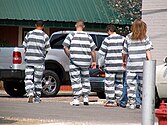
Back Mag (sosiale wetenskappe) Afrikaans نفوذ Arabic Улада Byelorussian Улада BE-X-OLD Власт (обществено отношение) Bulgarian Moć (socijalna i politička) BS Poder (sociologia) Catalan Guòng-lĭk CDO ھێز (فەلسەفە) CKB Moc Czech
| Part of a series on |
| Sociology |
|---|
 |
In political science, power is the ability to influence or direct the actions, beliefs, or conduct of actors.[1][2][3] Power does not exclusively refer to the threat or use of force (coercion) by one actor against another, but may also be exerted through diffuse means (such as institutions).[4]
Power may also take structural forms, as it orders actors in relation to one another (such as distinguishing between a master and an enslaved person, a householder and their relatives, an employer and their employees, a parent and a child, a political representative and their voters, etc.), and discursive forms, as categories and language may lend legitimacy to some behaviors and groups over others.[3]
The term authority is often used for power that is perceived as legitimate or socially approved by the social structure. [5]
Scholars have distinguished between soft power and hard power.[6][7]
- ^ McLean, Iain; McMillan, Alistair (26 February 2009). The Concise Oxford Dictionary of Politics. OUP Oxford. ISBN 978-0-19-101827-5.
- ^ "Definition of POWER". www.merriam-webster.com. 11 October 2024. Retrieved 15 October 2024.
- ^ a b Barnett, Michael; Duvall, Raymond (2005). "Power in International Politics". International Organization. 59 (1): 39–75. doi:10.1017/S0020818305050010. ISSN 0020-8183. JSTOR 3877878. S2CID 3613655.
- ^ Finnemore, Martha; Goldstein, Judith (2013), "Puzzles about Power", Back to Basics: State Power in a Contemporary World, Oxford University Press, doi:10.1093/acprof:oso/9780199970087.003.0001, ISBN 978-0-19-997008-7, retrieved 9 April 2022
- ^ "Authority | Definition, Types & Uses | Britannica". www.britannica.com. Retrieved 15 October 2024.
- ^ Wilson III, E. J. (2008). Hard power, soft power, smart power. The annals of the American academy of Political and Social Science, 616(1), 110-124.
- ^ Gray, Colin S. Hard power and soft power: the utility of military force as an instrument of policy in the 21st century. Lulu. com, 2011.



